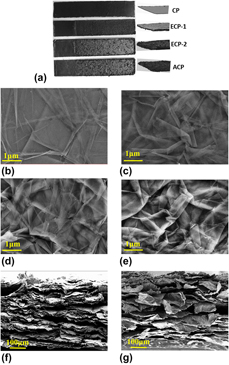Crossref Citations
This article has been cited by the following publications. This list is generated based on data provided by
Crossref.
Ruan, Chaohui
Li, Pengxi
Xu, Jing
Chen, Yucheng
and
Xie, Yibing
2019.
Activation of carbon fiber for enhancing electrochemical performance.
Inorganic Chemistry Frontiers,
Vol. 6,
Issue. 12,
p.
3583.
Xu, Jing
Mu, Yakui
Ruan, Chaohui
Li, Pengxi
and
Xie, Yibing
2020.
S or N-monodoping and S,N-codoping effect on electronic structure and electrochemical performance of tin dioxide: Simulation calculation and experiment validation.
Electrochimica Acta,
Vol. 340,
Issue. ,
p.
135950.
Bao, Wenyun
Wu, Ye
Xie, Yibing
and
Yao, Chen
2020.
Fabrication and electrochemical performance of nickel oxide nanoparticles anchored titanium dioxide nanotube array hybrid electrode.
Functional Materials Letters,
Vol. 13,
Issue. 04,
p.
2051017.
Wang, Yinrui
and
Xie, Yibing
2020.
Electroactive FeS2-modified MoS2 nanosheet for high-performance supercapacitor.
Journal of Alloys and Compounds,
Vol. 824,
Issue. ,
p.
153936.
Mu, Yakui
Ruan, Chaohui
Li, Pengxi
Xu, Jing
and
Xie, Yibing
2020.
Enhancement of electrochemical performance of cobalt (II) coordinated polyaniline: A combined experimental and theoretical study.
Electrochimica Acta,
Vol. 338,
Issue. ,
p.
135881.
Xie, Yi Bing
2020.
Preparation and Electrochemical Properties of Flow-Through TiO<sub>2</sub> Nanoarray.
Journal of Nano Research,
Vol. 65,
Issue. ,
p.
1.
Ruan, Chaohui
Li, Pengxi
Xu, Jing
and
Xie, Yibing
2020.
Electrochemical performance of hybrid membrane of polyaniline layer/full carbon layer coating on nickel foam.
Progress in Organic Coatings,
Vol. 139,
Issue. ,
p.
105455.
Xie, Yibing
and
Wang, Yinrui
2020.
Electronic structure and electrochemical performance of CoS2/MoS2 nanosheet composite: Simulation calculation and experimental investigation.
Electrochimica Acta,
Vol. 364,
Issue. ,
p.
137224.
Xie, Yibing
2020.
Capacitive Behavior of Sodium Ion Pre-Intercalation Manganese Dioxide Supported on Titanium Nitride Substrate.
Nano,
Vol. 15,
Issue. 12,
p.
2050152.
Ruan, Chaohui
and
Xie, Yibing
2020.
Electrochemical performance of activated carbon fiber with hydrogen bond-induced high sulfur/nitrogen doping.
RSC Advances,
Vol. 10,
Issue. 62,
p.
37631.
Xie, Yibing
and
Yao, Chen
2020.
Electrochemical performance of RuO2-TiO2nanotube hybrid electrode material.
Materials Research Express,
Vol. 6,
Issue. 12,
p.
125550.
Li, Pengxi
Ruan, Chaohui
Xu, Jing
and
Xie, Yibing
2020.
Supercapacitive performance of CoMoO4 with oxygen vacancy porous nanosheet.
Electrochimica Acta,
Vol. 330,
Issue. ,
p.
135334.
Abdelrahim, Ahmed M.
Abd El-Moghny, Muhammad G.
and
El-Deab, Mohamed S.
2021.
In situ generation of exfoliated graphene layers on recycled graphite rods for enhanced capacitive performance of Ni–Co binary hydroxide.
RSC Advances,
Vol. 11,
Issue. 42,
p.
26258.
Xie, Yibing
and
Chen, Yucheng
2021.
Experimental and computational investigation of Cu–N coordination bond strengthened polyaniline for stable energy storage.
Journal of Materials Science,
Vol. 56,
Issue. 16,
p.
10135.
Xie, Yibing
2021.
Fabrication and electrochemical properties of flow-through polypyrrole and polypyrrole/polypyrrole nanoarrays.
Chemical Papers,
Vol. 75,
Issue. 5,
p.
1831.
Xie, Yibing
2021.
Fabrication and charge storage capacitance of PPY/TiO2/PPY jacket nanotube array.
Journal of Polymer Engineering,
Vol. 41,
Issue. 2,
p.
137.
Arvas, Melih Besir
Gencten, Metin
and
Sahin, Yucel
2021.
One-step synthesized N-doped graphene-based electrode materials for supercapacitor applications.
Ionics,
Vol. 27,
Issue. 5,
p.
2241.
Bao, Wenyun
Wu, Ye
Xie, Yibing
and
Yao, Chen
2021.
Fabrication and electrical double-layer capacitance performance of interconnected and independent titania nanotube array.
Materials Research Innovations,
Vol. 25,
Issue. 1,
p.
8.
Roy, Chanchal Kumar
Shah, Syed Shaheen
Reaz, Akter H.
Sultana, Sharmin
Chowdhury, Al‐Nakib
Firoz, Shakhawat H.
Zahir, Md. Hasan
Ahmed Qasem, Mohammed Ameen
and
Aziz, Md. Abdul
2021.
Preparation of Hierarchical Porous Activated Carbon from Banana Leaves for High‐performance Supercapacitor: Effect of Type of Electrolytes on Performance.
Chemistry – An Asian Journal,
Vol. 16,
Issue. 4,
p.
296.
Chen, J.
Li, C.
Lian, Y.
Chen, Y.
Chen, T.
and
Hu, X.
2021.
Understanding the oxygen-containing functional groups on multiwall carbon nanotubes toward supercapacitors.
Materials Today Chemistry,
Vol. 19,
Issue. ,
p.
100414.
